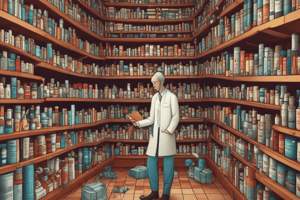Podcast
Questions and Answers
What is the primary cause of toxicity mentioned in the text?
What is the primary cause of toxicity mentioned in the text?
- Interaction between different medications
- Side effects of prescribed drugs
- Overdosage of medications
- Extension of the therapeutic effect itself (correct)
Which of the following is an example of toxicity due to the extension of therapeutic effect given in the text?
Which of the following is an example of toxicity due to the extension of therapeutic effect given in the text?
- Nausea caused by chemotherapy drugs
- Liver damage from excessive acetaminophen
- Coma induced by barbiturates (correct)
- Kidney failure due to contrast dyes
What type of adverse effect is mentioned in the text related to digoxin?
What type of adverse effect is mentioned in the text related to digoxin?
- Respiratory depression
- Gastrointestinal bleeding
- Complete atrioventricular (A-V) block (correct)
- Hepatotoxicity
Which medication is associated with the risk of bleeding?
Which medication is associated with the risk of bleeding?
Which of the following statements is NOT supported by the information provided in the text?
Which of the following statements is NOT supported by the information provided in the text?
Flashcards are hidden until you start studying
Study Notes
Adverse Drug Events vs. Adverse Drug Reactions
- Adverse drug events (ADEs) occur during drug therapy without a direct causal relationship to the medication.
- Adverse drug reactions (ADRs) are directly related to the medication and occur during appropriate use.
Examples of Adverse Drug Reactions
- Expected extensions of therapeutic effects can manifest as adverse reactions; for instance, heparin may lead to bleeding.
- Subsequent exposure to a drug can trigger an antigen-antibody interaction, leading to allergic symptoms.
Specific Drug Effects
- Quinine and quinidine can cause a range of side effects, including:
- Cramps
- Diarrhea
- Purpura (purple spots on the skin)
- Asthma attacks
- Vascular collapse in some individuals
Studying That Suits You
Use AI to generate personalized quizzes and flashcards to suit your learning preferences.




